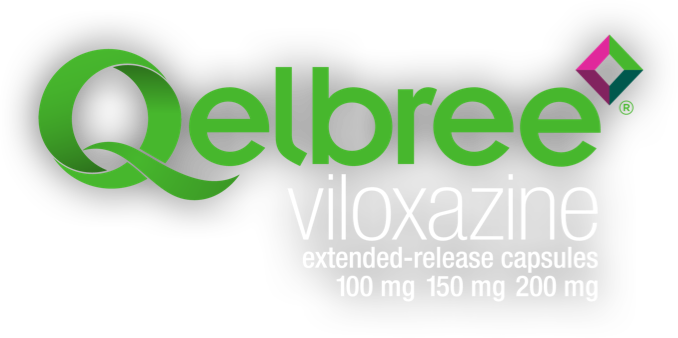
Results with Qelbree
Qelbree is an effective, safe*, and convenient once-a-day non-stimulant ADHD medication for adults and kids ages 6 years and older.
*Important: Monitor for mood or behavior changes. Your doctor should also monitor for changes in blood pressure and heart rate.
Qelbree and breastfeeding
If you are planning to have a child, it’s important to know certain information about your medications.
A study of 15 healthy lactating women receiving Qelbree 600 mg/day for 3 days found the transfer of Qelbree into breast milk is low.**
**This study did not specifically evaluate the effects of viloxazine on breastfed infants or milk production, nor are there additional data regarding these effects. The developmental and health benefits of breastfeeding should be considered along with the mother’s clinical need for Qelbree and any potential adverse effects on the breastfed child from Qelbree or from the underlying maternal condition.
Talk to your doctor to see if Qelbree might be right for you and your journey.
Qelbree is proven to significantly reduce ADHD symptoms
By reducing the impact of ADHD symptoms, Qelbree can help with the everyday things that are complicated by your ADHD.
In the 6-week clinical trial, adults taking Qelbree met the goal of a significant reduction in ADHD symptom scores at the end of the study. For some adults, Qelbree reduced ADHD symptom scores as early as week 2.
In a 6-week study, Qelbree—a non-stimulant—was proven to help effectively reduce ADHD symptoms.
Rapid and extended release for full-day coverage.

Clinical Trial Results
How we ran the study:
Qelbree was studied in adults ages 18-60 who had been diagnosed with ADHD.
The study measured what kind of changes in ADHD symptoms these adults experienced over the course of the clinical trial. They measured the frequency and severity of ADHD symptoms including inattention, hyperactivity, and impulsivity.
This was done using AISRS (Adult ADHD Investigator Symptom Rating Scale). This scale is the standard tool that helps measure the severity of symptoms over time.

Qelbree showed a significant reduction in symptom scores compared to placebo
In a 6-week clinical study, Qelbree was proven to reduce AISRS symptom severity scores.
Results you can feel
Treatment with Qelbree resulted in a 41% decrease in symptoms from the start of the study versus placebo, which was 32%
†In a randomized placebo-controlled flexible-dose trial with patients taking Qelbree 200 mg-600 mg/day.
Some patients showed symptom score improvement each week of the study compared to placebo, starting at week 2
Results your doctor can see
In a clinical study, physicians reported patients taking Qelbree had a greater improvement than patients receiving placebo. This was measured by the Clinical Global Impression Severity Scale (CGI-S)—a score physicians use to rate the observed severity of ADHD.
In a clinical study, physicians reported patients taking Qelbree had a greater improvement than patients receiving placebo. This was measured by the Clinical Global Impression Severity Scale (CGI-S)—a score physicians use to rate the observed severity of ADHD.

I have the attention to help make my goals
achievable
All things Qelbree, all at your fingertips
Check out the Qelbree brochure for an easy-to-reference roundup of key treatment info, plus helpful tips for adult ADHD.
Qelbree is proven to be safe‡, with manageable side effects
Qelbree was proven to be a safe‡ and effective treatment for ADHD, with a low incidence of side effects in a clinical trial when taken as directed.
‡Important: Monitor for mood or behavior changes. Your doctor should also monitor for changes in blood pressure and heart rate.
The majority of these side effects did not cause patients to stop treatment with Qelbree.
Qelbree is not a controlled substance and has no evidence for abuse or misuse.
Sometimes patients consider a planned break or “drug holiday,” from a medication due to side effects, or only take it “as needed” and not consistently. This is a conversation you should always have with your doctor before considering any kind of break.
Qelbree is unlikely to have negative interactions with stimulants like methylphenidate and amphetamine.
Most Common Side Effects
Side effect
Placebo
(183 people)
Qelbree
(189 people)
Difficulty sleeping (insomnia)§
7%
23%
Headacheǁ
7%
17%
Tiredness
3%
12%
Nausea
3%
12%
Decreased appetite
3%
10%
Dry mouth
2%
10%
Sleepiness
(somnolence)***
2%
6%
Constipation
1%
6%
§Insomnia included initial, middle, and late insomnia, poor quality sleep, sleep disorder.
ǁHeadache: headache, migraine, migraine with aura, tension headache.
***Somnolence: somnolence, lethargy, sedation.
9% of participants taking Qelbree discontinued the clinical trial due to side effects vs 5% taking placebo.
As with any treatment decision, you should always consult your doctor.
Get help talking to a doctor with our guide.



